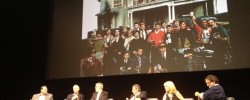
This Week on Demand: 24/03/2013
Good things come to those who wait. It’s not been the strongest of months for Netflix subscribers, March. A promising opening week gave way to dismal successors, the past fortnight’s offerings—while not without their high points—leaving us in something of a dry spell, starved for new streaming cinematic quality. Now, at last, the patient are rewarded with a pair of films that, rather appropriately, beg patience for their full impact to be appreciated. Structurally and stylistically challenging in one form or another, they offer a fine counterpoint to the plentiful lesser options this week includes, tiresome thrillers and haggard horrors making it clear that switching one’s brain off isn’t always the key to an entertaining experience.

Cosmopolis (Read our full review)
David Cronenberg’s Cosmopolis is not a film for everyone. I know this. Nor was Don DeLillo’s book, from which Cronenberg deviates slightly but significantly. Published in 2003, the novel’s focus on a billionaire investor whose fortune evaporates over the course of a single hectic day has all the more worldly relevance in our current economy, a fact Cronenberg exploits but never allows to undermine the existential essence of the source. Meeting DeLillo’s stoic, arrhythmic use of language with his own eerie visual sensibility and the breakthrough performance he elicits from Robert Pattinson, Cronenberg—assuming script duty for the first time since 1999’s eXistenZ—crafts an unyieldingly challenging viewing experience as exalting to those who bear with it as it is excruciating to those who do not. Many will be bored by its austere artifice, but those who submit themselves to Cosmopolis’ strange allure will be rewarded with one of the great cinematic masterpieces of our times. MUST SEE.

Entre Nos
Paying tribute to the mother who raised her and her brother on the tough streets of New York when their father abandoned them just shortly after immigrating, Paolo Mendoza creates a deeply personal emotional experience with Entre Nos, charting the dark underbelly of the American Dream as encountered by her own family. Though well performed by its central cast—Mendoza herself plays her mother—the story is perhaps too close to the storyteller; though assuaged to a degree by the presence of Gloria La Morte as co-writer/director, the film seems almost biographical to a flaw, neither gritty nor affecting enough to make its points to outsiders in a particularly impactful fashion. Though therein withheld from any greatness, Entre Nos does remain an involving tale throughout, Mendoza and her young co-stars carrying its emotional toll primarily with facial expressions alone, the crisp direction tracing this tired family’s sad path through an unwelcoming new land. WORTH WATCHING.

Fat kid Rules the World
Having garnered considerable attention and acclaim for 2011’s Terri, Jacob Wysocki again plays the role of the overweight social outcast in Fat Kid Rules the World, bringing equal parts tragedy and comedy to a role cloaked in jet-black humour. Actor Matthew Lillard directs, structuring the story with frequent fantasy sequences that indulge in often brutal violence, his protagonist’s regular daydreams of suicide and murder lending the film a certain disquieting emotional instability. Wysocki is terrific, as too is Matt O’Leary as the drug-swallowing guitarist who attempts to manipulate him under the pretence of forming a band together; the gradual development of their friendship, though undoubtedly predictable, is an effective centre to the film’s drama. More audacious than most stories of this sort would dare to be, it’s precisely its gruesome edginess that earns Fat Kid Rules the World so much of its impact, its wicked playfulness overcoming the limitations of formula. RECOMMENDED.

Follow Me: The Yoni Netanyahu Story
The sole Israeli soldier killed in action during Operation Entebbe, in which the Israel Defence Forces stormed a hijacked plane grounded in Uganda to rescue some 106 hostages held by the Popular Front for the Liberation of Palestine, Yonatan Netanyahu has since become known as a great hero of Israel. His personal letters form the basis of Follow Me: The Yoni Netanyahu Story, a ruminative documentary examining his life in the years leading up to his death. Supported by interviews with family and friends—including brother Benjamin, now Prime Minister of Israel—the film offers an engrossing understanding of its subject, though its aims are ill-served in the noodling excess of its sentimental score. Still, there’s more than enough in the lyrical quality of Netanyahu’s writing to support the weaker portions of this portrait; his poetic outlook makes him a fascinating chronicler of conflict, the beauty of his words contrasted with the hideousness of that which they describe. WORTH WATCHING.

House Hunting
Suffering almost immediately from the drawbacks of its less-than-stellar performances and editing that might, at best, be described as haphazard, House Hunting shamefully squanders a potentially intriguing premise with its unfulfilling production values. Concerning two families who find themselves unable to leave a property they each intended to purchase, it’s ostensibly a gritty take on the cutthroat world of real estate and the inhumanity of economy, yet each and every point debut director Eric Hurt attempts to make is overshadowed by his inability to reign in these performances and restrain the film as a whole from the strange hysteria into which it often descends. Not without its merits, House Hunting does have the benefit of some nicely nasty gore and an appreciably intriguing conclusion, but it’s much too little too late to save a haplessly middling exercise in conventional repetition. This is a topic that’s been tackled far better elsewhere (see Dream Home). AVOID IT.

Keep the Lights On
Spread across almost a decade beginning in 1998, Ira Sachs’ melancholy autobiographical feature Keep the Lights On charts the relationship between a lively Danish filmmaker and the closeted lawyer he initially meets on a phone sex line. Brilliantly acted by Thure Lindhart and Zachary Booth, it’s a story of searing emotion that’s almost visceral in its impact, the fraught romance between the men brought to beautiful yet painful life in the elliptical structure of Sachs’ script and the soft imagery of Dogtooth and Attenberg cinematographer Thimios Bakatakis. The inevitable comparisons to Andrew Haigh’s Weekend do it a disservice, the superiority of that film and its grip on its own central relationship considered, but there’s enough difference in Keep the Lights On to earn it an identity of its own, enough raw power in the reality of Sachs’ treatment to make this relationship and its tragedy a bitterly compelling experience of its own. HIGHLY RECOMMENDED.

Stolen
Another day, another utterly unremarkable Nicolas Cage thriller. Thrusting the pedal to the metal for its opening 20 minutes, Stolen’s initial action pacing does well to disguise the mediocrity to come, its familiar but nonetheless fun heist sequence functional enough in its introduction of Cage as a talented thief and, naturally, caring father. Caught for the crime, but not with the cash, the character emerges from eight years in prison only to have his daughter immediately kidnapped by a jilted former partner demanding his share of the score. Procedural hijinks ensue, Cage and co spouting rote dialogue as the ludicrously ill-fitting soundtrack drones on. It’s evident that director Simon West was too busy with The Expendables 2 to lend much attention here; his presence is barely noticeable, save for a solid third act set piece. Even the enjoyably madcap work of Josh Lucas as an absurdly theatrical villain can’t do much to elevate Stolen, yet another forgettable notch in Cage’s belt. AVOID IT.

Sushi Girl
Far more inspired by the work of Quentin Tarantino than any one film ought to be, debut director Kern Saxton’s Sushi Girl is not so much indebted to Reservoir Dogs as it is in awe of it, recreating the scenario of a group of colourful characters in the aftermath of a heist gone awry who attempt to discern each other’s loyalties amidst a liberal spattering of blood. Though differing in the fact that its conflict occurs a number of years after said heist, the film spends far too much of its running time in the shadow of Tarantino, its dialogue—though inventive in its own right—undermining itself by the comparisons it evokes. Even so, there is much to be enjoyed here, be it the deliriously zany performances or the wildly explicit gore in which Saxton periodically indulges. Channelling yet more Tarantino in its final act, Sushi Girl is a solid debut from a director who desperately needs to find his own voice. SO-SO.

The Factory
Appropriately arriving in the same week as the latest mediocre effort from Nicolas Cage is the latest mediocre effort from John Cusack, whose output often seems to parallel Cage’s in its frequent indulgence in substandard fare. This time he plays a hardened detective tirelessly on the trail of a serial killer who, coincidentally, comes to kidnap his teenage daughter. Composed entirely of plot points, dialogue, and a moodiness already seen in thrillers innumerable, The Factory is almost as exciting as an extended episode of an average police procedural. Cusack does his best to look tired, Jennifer Carpenter largely reprises her role from Dexter, Mae West screams while tied up, and director Morgan O’Neill contributes little beyond a basic structure and visual style that began to wear thin in the 1980s. Reputedly shot over four years ago, it’s clear what this belated release has to say about The Factory’s quality; its own distributors have no faith in it, nor should you. AVOID IT.
Related Posts
Ronan Doyle
Latest posts by Ronan Doyle (see all)
- TIFF’s TOGA! The Reinvention of American Comedy Review: Airplane! (1980) - August 8, 2013
- Locarno Review: The Dirties (2013) - August 8, 2013
- This Week on Demand: 04/08/02013 - August 7, 2013
-
http://www.facebook.com/people/Chris-D-Misch/28134555 Chris D. Misch
-
Ronan
































